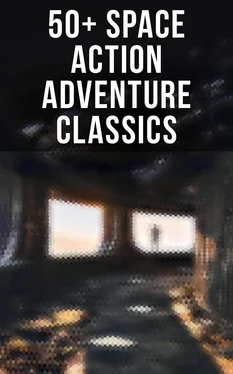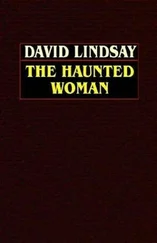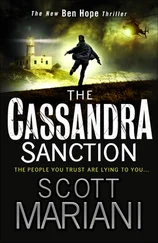I laughed loudly and long. And behold! even as I laughed the keen point of things accomplished stabbed my mirth, and I was weeping, weeping aloud, convulsed with weeping, and the tears were pouring down my face.
Everywhere the awakening came with the sunrise. We awakened to the gladness of the morning; we walked dazzled in a light that was joy. Everywhere that was so. It was always morning. It was morning because, until the direct rays of the sun touched it, the changing nitrogen of our atmosphere did not pass into its permanent phase, and the sleepers lay as they had fallen. In its intermediate state the air hung inert, incapable of producing either revival or stupefaction, no longer green, but not yet changed to the gas that now lives in us… .
To every one, I think, came some parallel to the mental states I have already sought to describe — a wonder, an impression of joyful novelty. There was also very commonly a certain confusion of the intelligence, a difficulty in self-recognition. I remember clearly as I sat on my stile that presently I had the clearest doubts of my own identity and fell into the oddest metaphysical questionings. “If this be I,” I said, “then how is it I am no longer madly seeking Nettie? Nettie is now the remotest thing — and all my wrongs. Why have I suddenly passed out of all that passion? Why does not the thought of Verrall quicken my pulses?” …
I was only one of many millions who that morning had the same doubts. I suppose one knows one’s self for one’s self when one returns from sleep or insensibility by the familiarity of one’s bodily sensations, and that morning all our most intimate bodily sensations were changed. The intimate chemical processes of life were changed, its nervous metaboly. For the fluctuating, uncertain, passion-darkened thought and feeling of the old time came steady, full-bodied, wholesome processes. Touch was different, sight was different, sound and all the senses were subtler; had it not been that our thought was steadier and fuller, I believe great multitudes of men would have gone mad. But, as it was, we understood. The dominant impression I would convey in this account of the Change is one of enormous release, of a vast substantial exaltation. There was an effect, as it were, of lightheadedness that was also clearheadedness, and the alteration in one’s bodily sensations, instead of producing the mental obfuscation, the loss of identity that was a common mental trouble under former conditions, gave simply a new detachment from the tumid passions and entanglements of the personal life.
In this story of my bitter, restricted youth that I have been telling you, I have sought constantly to convey the narrowness, the intensity, the confusion, muddle, and dusty heat of the old world. It was quite clear to me, within an hour of my awakening, that all that was, in some mysterious way, over and done. That, too, was the common experience. Men stood up; they took the new air into their lungs — a deep long breath, and the past fell from them; they could forgive, they could disregard, they could attempt… . And it was no new thing, no miracle that sets aside the former order of the world. It was a change in material conditions, a change in the atmosphere, that at one bound had released them. Some of them it had released to death… . Indeed, man himself had changed not at all. We knew before the Change, the meanest knew, by glowing moments in ourselves and others, by histories and music and beautiful things, by heroic instances and splendid stories, how fine mankind could be, how fine almost any human being could upon occasion be; but the poison in the air, its poverty in all the nobler elements which made such moments rare and remarkable — all that has changed. The air was changed, and the Spirit of Man that had drowsed and slumbered and dreamt dull and evil things, awakened, and stood with wonder-clean eyes, refreshed, looking again on life.
The miracle of the awakening came to me in solitude, the laughter, and then the tears. Only after some time did I come upon another man. Until I heard his voice calling I did not seem to feel there were any other people in the world. All that seemed past, with all the stresses that were past. I had come out of the individual pit in which my shy egotism had lurked, I had overflowed to all humanity, I had seemed to be all humanity; I had laughed at Swindells as I could have laughed at myself, and this shout that came to me seemed like the coming of an unexpected thought in my own mind. But when it was repeated I answered.
“I am hurt,” said the voice, and I descended into the lane forthwith, and so came upon Melmount sitting near the ditch with his back to me.
Some of the incidental sensory impressions of that morning bit so deeply into my mind that I verily believe, when at last I face the greater mysteries that lie beyond this life, when the things of this life fade from me as the mists of the morning fade before the sun, these irrelevant petty details will be the last to leave me, will be the last wisps visible of that attenuating veil. I believe, for instance, I could match the fur upon the collar of his great motoring coat now, could paint the dull red tinge of his big cheek with his fair eyelashes just catching the light and showing beyond. His hat was off, his dome-shaped head, with its smooth hair between red and extreme fairness, was bent forward in scrutiny of his twisted foot. His back seemed enormous. And there was something about the mere massive sight of him that filled me with liking.
“What’s wrong?” said I.
“I say,” he said, in his full deliberate tones, straining round to see me and showing a profile, a well-modeled nose, a sensitive, clumsy, big lip, known to every caricaturist in the world, “I’m in a fix. I fell and wrenched my ankle. Where are you?”
I walked round him and stood looking at his face. I perceived he had his gaiter and sock and boot off, the motor gauntlets had been cast aside, and he was kneading the injured part in an exploratory manner with his thick thumbs.
“By Jove!” I said, “you’re Melmount!”
“Melmount!” He thought. “That’s my name,” he said, without looking up… . “But it doesn’t affect my ankle.”
We remained silent for few moments except for a grunt of pain from him.
“Do you know?” I asked, “what has happened to things?”
He seemed to complete his diagnosis. “It’s not broken,” he said.
“Do you know,” I repeated, “what has happened to everything?”
“No,” he said, looking up at me incuriously for the first time.
“There’s some difference — — — “
“There’s a difference.” He smiled, a smile of unexpected pleasantness, and an interest was coming into his eyes. “I’ve been a little preoccupied with my own internal sensations. I remark an extraordinary brightness about things. Is that it?”
“That’s part of it. And a queer feeling, a clearheadedness — — — “
He surveyed me and meditated gravely. “I woke up,” he said, feeling his way in his memory.
“And I.”
“I lost my way — I forget quite how. There was a curious green fog.” He stared at his foot, remembering. “Something to do with a comet. I was by a hedge in the darkness. Tried to run… . Then I must have pitched into this lane. Look!” He pointed with his head. “There’s a wooden rail new broken there. I must have stumbled over that out of the field above.” He scrutinized this and concluded. “Yes… .”
“It was dark,” I said, “and a sort of green gas came out of nothing everywhere. That is the last I remember.”
“And then you woke up? So did I… . In a state of great bewilderment. Certainly there’s something odd in the air. I was — I was rushing along a road in a motorcar, very much excited and preoccupied. I got down — — ” He held out a triumphant finger. “Ironclads!”
Читать дальше











